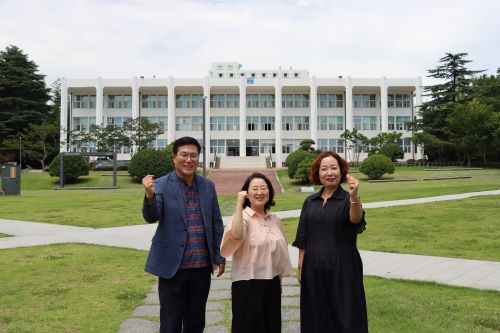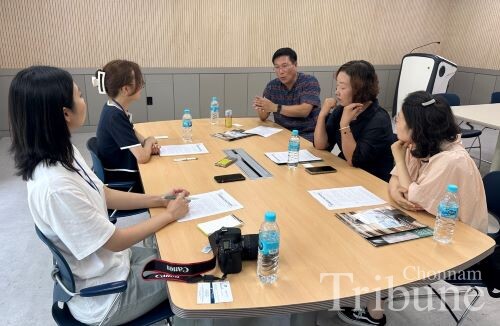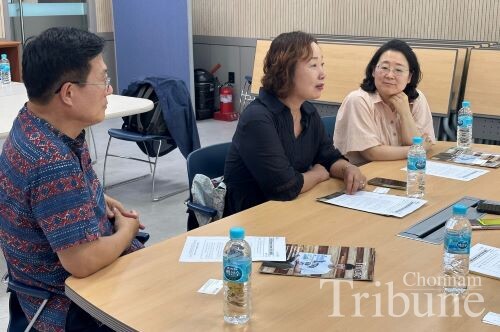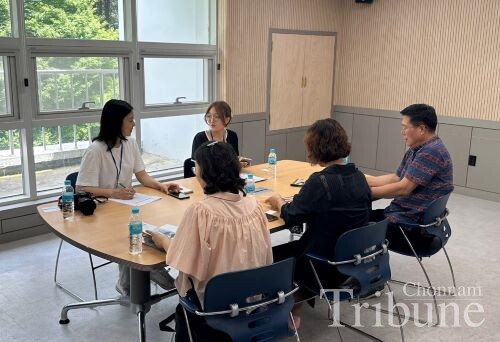
On June 26, Chonnam National University (CNU) commenced its 2023 International Summer Session (ISS), a program that invites renowned professors from different countries to deliver high-quality lectures to not only CNU students but also foreign students. The Chonnam Tribune had the opportunity to interview three alumni professors, Cha Heung-ju (’82, Department of Global Business, University of Redlands), Jeon Gyeong-seon (’91, Department of English, Columbus State University), and Kang So-hee (’91, Department of Computer and Mathematics Sciences, University of Toronto-Scarborough), who were invited back to CNU, their alma mater. This interview held on July 6 focused on their experiences as professors teaching students from diverse cultural backgrounds and their perspectives on internationalized education. It marks their second interview with the Tribune magazine in 11 years.

Q. Could you introduce yourself?
Cha Heung-ju (CHJ): My name is Heung-ju Cha. I teach and hold a Ph.D. in finance. I graduated from the Faculty of Business Administration at CNU in 1989. I worked at Daishin Securities for five years, collaborating with many MBA graduates from foreign universities and investment bankers. During that time, I realized the importance of continuous learning. Growing up with American movies, I always had a desire to study abroad. However, during my time at CNU, I faced limitations in my studies due to demonstrations. This motivated me to pursue further education, and I eventually obtained a Ph.D. in Finance from the University of Houston. I have been working at the University of Redlands for approximately 30 years.
Jeon Gyeong-seon (JKS): I am Jeon Gyeong-seon. I am a professor of Linguistics and TESOL in the Department of English at Columbus State University. I have been teaching there for 20 years. I entered CNU in 1991 and graduated in 1994. Then, I went to the USA in 1995. I pursued my master's degree in Bilingual and Bicultural Studies at the University of Texas at San Antonio. Later, I earned my Ph.D. from Georgetown University. Currently, in the US, I teach English Language and also coordinate a second language program, which involves sending many American students abroad. Thanks to CNU, students from my university also participate in the ISS, which serves as a great motivation for me to return to Korea and teach."
Kang So-hee (KSH): My name is So-hee Kang, and I am an associate professor at the University of Toronto-Scarborough. I completed my undergraduate and master's degrees at CNU, and then I pursued further studies at the University of Toronto (UOT) in Canada. Initially, I entered a Ph.D. program in statistics, but it required a strong foundation in math theory, which I lacked due to my undergraduate studies in computer science. I faced difficulties during the time there, so I made the decision to change my major and earned a Ph.D. in biostatistics. Currently, I am teaching at UOT.

Q. As graduates of CNU and currently professors in various universities across North America, how have your experiences at CNU shaped the way you teach or approach education? Additionally, what are the rewards and challenges of teaching in a different country?
CHJ: I am always aware that I represent CNU while studying abroad or working in the USA, even though I am not an official representative. However, at the time, there were not many students from CNU, so it felt that way. This situation also had a positive aspect because it motivated me to work harder than others. When I returned to study after completing my military service, I took my first finance class and met a professor there. That professor was completely different from my other professors. He is the reason why I chose finance as my major, and I still have a strong connection with the field. I realized that one professor or a good mentor can completely change a student's life. When I studied abroad and obtained my Ph.D., my goal was to return to CNU and serve CNU students. I aspire to be a professor who can encourage and motivate students, serving as a role model. Teaching in English is challenging because it is not my native language. However, being able to teach in English provides a significant advantage for a professor, as it opens opportunities to be invited by different universities in different countries. I love learning and traveling, so teaching in English is rewarding. Of course, regardless of the situation, English is always challenging for non-native speakers. However, this challenge pushes you to work harder to develop your teaching methods and utilize technology to attract students and receive positive evaluations.
JKS: Teaching in Korea is different from teaching American students. There is a lot of diversity here that I didn't experience when I was studying at CNU. While most students were Koreans back then, now there are students from the USA, Canada, New Zealand, China, etc. This is something I didn't expect and it requires me to adjust my approach to teaching. They have different expectations, cultural differences, different ideals about teachers and perceptions of their roles as students. I also noticed gaps in their expectations regarding the amount of effort they should put into the class. ISS classes are quite intensive, and students often find them challenging and overwhelming. Therefore, I have to make adjustments. It is a learning experience for me to adapt and change the way I teach based on what I learn from them. Additionally, there is a perspective shift. Korean students are serious about their grades. Initially, I didn't understand why some of them were particular about their scores, but later I realized that there is a relative grading system that requires me to rank them, which is something I didn't have to do with my American students. It is rewarding to gain different perspectives and understand the expectations of students from diverse cultural backgrounds. Adjusting my teaching style, not only in terms of content, but also in the type of assignments, grading, and exams, can be challenging.
KSH: In general, I believe that not only myself but CNU students, and especially Koreans, are highly diligent. We have often experienced various challenges and setbacks, which has made us very persistent. Personally, I have a positive personality. Many times, I have encountered challenges and difficulties that seemed insuperable. However, through persistence, diligence, and a positive mindset, I have been able to overcome the hardships of my Ph.D. program. Teaching in a different country presents its own set of extreme challenges. Imagine taking lessons from a professor who doesn't speak Korean perfectly. However, I can compensate for this by explaining concepts in simple language due to English being my second language. Statistics is a complex subject that requires mathematical and critical thinking skills, so I try to explain it in a clear and accessible fashion. This may be one of the advantages of professors who speak English as a second language.

Q. How do the diverse backgrounds of your students and your international experiences influence the learning environment?
CHJ: Currently, I hold the position of chair in the Global Business Department and also serve as the director of the Asian Studies Program. As a result, my work revolves around internationality, which aligns well with my background as an international student in the past. My area of research and teaching focuses on international finance, and I love traveling and learning about new cultures, environments, and histories. It seems that the international characteristic runs through my veins. Nowadays, CNU has a greater number of international students in many classes compared to typical universities in the U.S. This presents a great opportunity for both students and professors to learn from diverse views and knowledge. In the ISS, I aim to share what foreign students do and show the historical development of theories. I believe it is important for students to understand the origins of concepts, rather than just the technological aspects, as they can learn later from professors at CNU. And, to become a global citizen, you must perceive things differently and transcend their own boundaries, such as their country. Therefore, I intend to share diverse insights based on my international experiences.
JKS: I have noticed that many students I teach in the U.S. do not have extensive international experiences. However, when I share stories about what happens here in Korea, they become genuinely interested. I believe that my presence and my experiences with students from different backgrounds, especially those from Korea, serve as motivation for them to consider studying abroad or visiting Korea. Many of my students face the challenge of balancing work and college, which often leads to constraints in terms of both time and money issues. They do not have the privilege of traveling. Therefore, I believe that by bringing stories from Korea into my classroom, I indirectly expose them to different cultural perspectives and help them learn about diverse students.
KSH: When teaching the introduction to statistics, I have a large class with almost five hundred students. I realized that students come from diverse backgrounds. Depending on their country of origin, their background knowledge varies significantly. Teaching students with such diverse cultural backgrounds presents its challenges. Overcoming or bridging the gap between their backgrounds, including wealth disparities, remains a concern for me. To address this, I conduct surveys to gather information about their backgrounds. Additionally, I ask students about their motivation for taking my course and their likes and dislikes about statistics. Constantly finding different ways to bridge the gap between students' varied levels of preparedness, motivates me.
Q. Other than ISS, do you have any involvement in academic collaborations on an international scale? Are there any benefits of doing so?
CHJ: I regularly visit not only China and Vietnam but also many other countries to teach, interact with students and professors, and conduct my research during summer sessions. As a faculty member engaged in international collaborations, I have the opportunity to share my diverse cultural experiences with my students.
JKS: I have a program in Busan right after the ISS. I started a partnership with Busan Global Village, an English school operated by the city of Busan. As part of this collaboration, my students are invited to serve as teachers during an English camp. This program has gained popularity, and this year we have eleven students participating, including eight who attended the ISS. While teaching abroad, students have the opportunity to network with native teachers in the host country and experience a different work culture from that of America. Through this program, I also collect data from participating students to maintain reflective journals about their international internship experiences, which I believe is crucial in becoming global citizens.
KSH: Professors have numerous opportunities for international collaborations, including conferences and research collaborations with researchers from different countries. Therefore, I consider it as one of the benefits of being an academic faculty member. I have a close academic relationship with Japan, and they are planning to visit Canada. They have obtained a grant to travel abroad and meet their collaborators. One of the significant advantages of engaging in international collaborations is that it allows you to travel to other countries with a smaller budget.
Q. Is there any advice you could give to the students of your alma mater, in terms of what it means to be a young adult in the age of international connectedness and cultural diversity?
CHJ: As an expert in finance, I want to emphasize that young adults possess the most valuable asset at this moment, and that is their youth. Regardless of your social and economic background, you all have this asset. So, embrace it and enjoy the journey while thinking how to utilize this asset effectively. Firstly, you should focus on understanding yourself and defining your success on your own. Keep in mind that everyone has different goals, but the point is to set high aspirations and take action. For students, taking action means learning. So, aim high, and learn!
JKS: Having an open-minded attitude and mindset is important. By being open-minded, I mean being receptive to challenges, embracing diversity, seizing opportunities, and being open to different languages. When you live in a small province, it's easy to become provincial or closed-minded, and that can hinder your progress. Therefore, my advice would simply be to just be open-minded.
KSH: I believe that 'being proud of being Korean' is highly important. It is disheartening to hear complaints about Korea from the younger generation and see some of them idolize other cultures. As someone who has traveled to many countries, I can confidently say that Korea is a great country to live in. Embracing your Korean identity while remaining open-minded to other cultures is essential. Remember, different does not mean wrong, so it is important not to be judgmental.
By Jung Da-gyo, Reporter / Lee Younny, Editor-in-Chief

